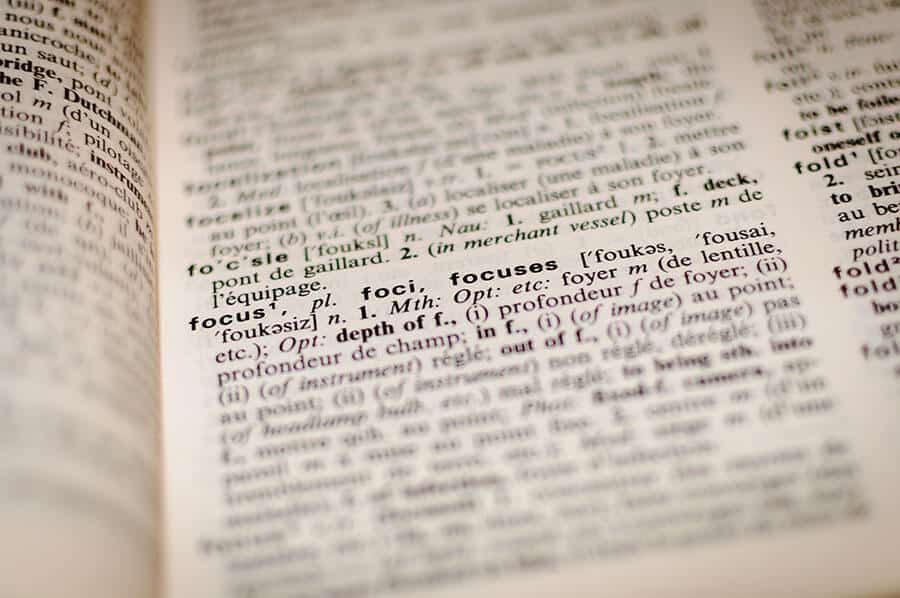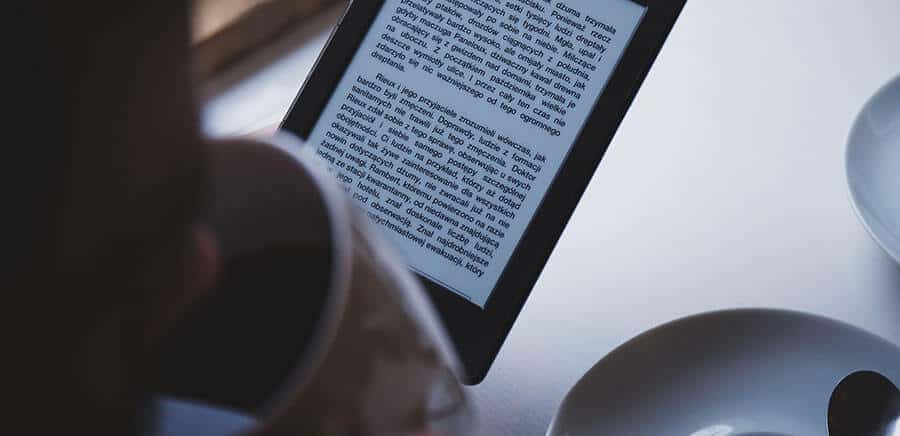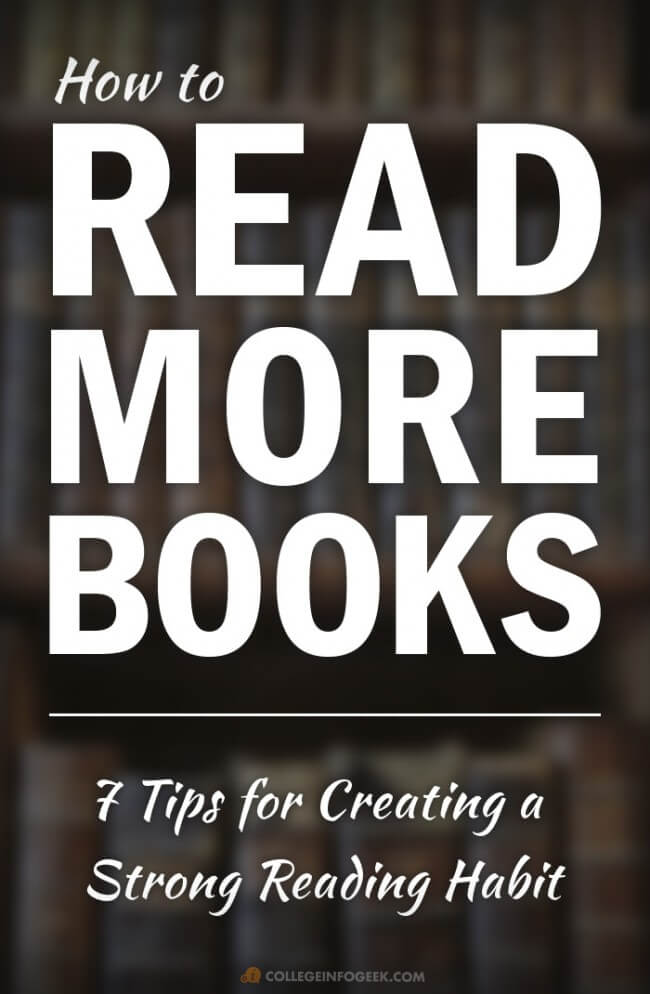In the Japanese language, there’s a word we have no equivalent for in English – tsundoku, which literally means the act of buying books and letting them pile up, unread.
Let me tell you, I’ve got my tsundoku game on lock. Every time I set foot in a bookstore, I can’t stop myself from buying a new book – even though I have essentially zero bookshelf space left. And, so far, most of those books have remained unread.
I could quote lots of smart people who praise the value of owning lots of unread books to make myself feel better…
“Collect books, even if you don’t plan on reading them right away. Nothing is more important than an unread library.” – John Waters
…but the fact remains that I should (and would very much like to) read more. Those books can’t stay unfinished forever.
Now, it’d be really easy to make excuses for why I don’t read enough. Work’s piling up, I need to get to the gym, I’m too tired to read, blah blah blah…
However, I know two things that cut right through these excuses.
Firstly,
“If you want something bad enough, you’ll make time for it.” – someone smart
…and secondly, Parkinson’s Law: Work expands to fill the time allotted for it.
That means that if I want to read more, I need to make time to do so – and my work will just have to fit into the resulting smaller amount of time remaining.
And that’s exactly what I’m doing now. I’ve made reading a priority, and the results have been awesome – in the past 10 days, I’ve read 269 pages (of non-fiction). And I’m not a fast reader – though I’ve used these reading speed tips to become faster than I used to be.
Some of you might not find that impressive; others will. The raw page numbers matter less than the relative improvement over my past efforts, and for me, averaging 26.9 pages a day is a damn good improvement.
So, how am I doing it? Just saying, “Make time for it!” is a bit vague, so here are 7 tips you can use for reading more consistently. These are the strategies and practices that I’ve built into my own reading goal – and many of them work for any type of goal.
- Set a daily page goal. Personally, I read at least 25 pages a day, without fail. This is perhaps the most important tip. Instead of saying, “I’ll read 2 books a month,” which encourages me to push reading off later into the month, shooting for a daily page goal means I have to put in consistent, daily effort. Over time, it really adds up.
- Read early in the day. As it gets later into the day, I know that the probability that I’ll sit down and read gets lower and lower. The early morning is the time when work and other things have the weakest grip on my attention, so that’s when I read.
- Read after exercising. From reading Spark: The Revolutionary New Science of Exercise and the Brain, I’ve learned that exercise (particularly aerobic exercise) primes our brains to learn more effectively and brings our ability to pay attention to its peak. So I go to skating practice, hit the gym, or go for a run in the morning. Then I read.
- Make the process enjoyable. Your motivation to complete a task is influenced by the reward you’ll receive, but I view the reward as a two-part deal. Yes, you get the reward that comes with accomplishing the task, but the task also holds an inherent reward if you enjoy doing it. So do what you can to enjoy your reading time. Personally, I head to my favorite coffee shop, grab a latte, and listen to a study playlist (here’s the one I use specifically for reading).
- Eliminate all distractions. Attention is less an act of focusing on one stimuli, and more the process of your brain blocking out others. So give your brain the best chance of success by removing distractions from your environment. When I read, I put my phone on Do Not Disturb, and I also put everything aside from my book into my bag, which goes onto the floor. Reading involves nothing but me, the book, my coffee, and a pair of headphones.
- Anticipate and remove barriers to success. What could potentially give your brain an excuse to skip reading tomorrow? Identify anything that could, and take steps beforehand to deal with it. For example, I make sure my bag is packed with my book and book flags (which I use for highlighting) each night – that way I’ll never derail due to forgetting something at home.
- Make yourself accountable. I’ve talked about the usefulness of commitment devices quite a bit, and naturally, I’m using them to help ensure I’ll read. To make reading a habit, I’ve set a goal of reading 25 pages a day for three months, and I’ve told my roommate Martin that I have to give him $100 if I skip even one day.
In addition to having Martin hold me accountable, I’ve also set up a goal-tracking page to chart my progress. On it, you’ll find a simple Google spreadsheet that’s updated each day with the number of pages I read, and the book I read them in.
If you want to read more consistently, tracking your progress might work well for you too! You can set up a spreadsheet like mine, or use an existing habit tracker like Habitica or Coach.me.
If you’re unable to see the video above, you can view it on YouTube.
In addition to the video above, College Info Geek’s student writer Ransom also wrote an in-depth article on how to read more books. While it overlaps some with my video, it gets into more detail about the “mental game” of reading and presents a different perspective on the topic. Since the article complements the video so well, we decided to combine them into a “mega-post” of sorts.
You’ll find Ransom’s take below.
So You Want to Read More Books?
 If you’re reading College Info Geek, then I’m going to assume you’re an ambitious person. You have many interests, you’re serious about getting good grades, and you want to get a great job when you graduate. You’re the sort of person, in other words, who wants to do all the things.
If you’re reading College Info Geek, then I’m going to assume you’re an ambitious person. You have many interests, you’re serious about getting good grades, and you want to get a great job when you graduate. You’re the sort of person, in other words, who wants to do all the things.
And if you’re anything like me or Thomas, you likely want to read ALL THE BOOKS as well. My “To-Read” shelf in Goodreads currently contains 191 titles, and I have a list in Evernote called “Book Recommendations” that contains about 30 titles. And besides all this, I also have a physical bookshelf at home and one in my dorm room, each containing their own share of unread volumes.

No doubt, I have the ambition to read a lot, and I bet you do too. As with many ambitious goals, however, I’m accomplishing a lot less in practice than I intend to. I think I read around 12 books last year (excluding assigned reading). According to the Pew Research Center, the median number of books read by an American adult in 2013 was 5, so by that standard I’m reading more than twice as many books in a year than the “average” American.
I’m not interested in being average, though. And frankly, I don’t even care how many books I read compared to the “average” American. My standards are people like Shane Parrish (who averages 3-5 books a week) or Maria Popova (who averages 15 books per week). If you haven’t heard of either of them, they run, respectively, Farnam Street and Brain Pickings, two of the most influential and wisdom-packed blogs on the Internet. Give either of these blogs a read and you’ll see the payoffs of such voracious reading.
The point is, compared to them (and, more importantly, to my own standards), I’m falling short. I want to read more, and I bet you do too. That’s why today I’m going to dig into the specifics of why we read less than we intend to and what to do about it.
By the end, you’ll have the information to start setting (and following through with) your own reading goals. There’s even a special bonus at the end to help keep you accountable.
Before we get into the meat of the article, though, an important side note.
Know Your Why
“I’m not saying that you have to be a reader to save your soul in the modern world. I’m saying it helps.”
I’m not going to get into all the reasons why reading books (as opposed to just Internet articles or periodicals) is good for your mind. I assume that if you’re reading this post, you’re convinced that reading more is valuable. If you do need persuading, have a look at this. It might just convince you.
But knowing that you “want to read more” is not enough. It’s a good starting point, but it’s missing the most important part of any new habit: the why. Why do you want to read more? Do you have a specific subject you want to learn more about, a skill you want to develop, a field you want to stay informed about? Or maybe you just want to get smarter (my reason, btw). Maybe you want to have an “edge” over the other people in your discipline.
There are many valid reasons, but you need to have one. That way, when you can’t bring yourself to pick up a book or when you think “skipping one day of reading won’t hurt,” you’ll have a reason to pull you back from the brink of habit decay.
“There are two kinds of professionals in your field: the people who read, and the people who don’t.”
I would advise against reading more “because x person on the Internet reads 1,000 books a year and OMG I’m so jealous!!!” It’s fine to be inspired by the reading habits of others (see above), but to make this habit stick, the reason needs to be more personal.
So go ahead, take a minute and figure out your “why.” Then write it down. This will form the basis of your “read more” plan.
Now that you’ve figured out why you want to read more, I’m going to get into why we suck so much at following through and actually reading the damn books.
Intentions vs Goals

Let’s make one thing clear: “I want to read more” is not a goal. It’s a statement of intention, and a vague one at that. It’s not quantified in any way, and it’s therefore nearly impossible to follow through. To read “more” you need a base rate that allows you to compare your current amount of reading to your ideal amount of reading.
For instance, if I read 12 books last year, I might say that I want to read 20 this year…or 24…or whatever. The point is that I’m making it quantitative and measurable. This way, I can know if I’m falling short of my goal.
That kind of thinking is a bit more productive, but we could still improve it. A year is a good place to start when it comes to setting goals, but if you’ve ever made a New Year’s Resolution, you know that year long goals usually fall apart unless they’re broken into smaller chunks.
What’s the solution? Get more specific. Set a daily reading goal. What kind you set depends on how much you currently read. If you regularly put in an hour a day, your plan to “read more” will differ from someone who currently reads 1-2 books a year (side note: for the purposes of my own reading goals, I don’t count assigned reading, especially if it’s from textbooks. But if you want to count that, or if it fits into your “why,” go ahead).
“If the book we’re reading doesn’t wake us up with a blow on the head, what are we reading it for?”
If you read very little now, I’d recommend setting an input-based goal. All that means is that you say you’ll put x amount into something, regardless of the return y. In the case of reading, this means the amount of time you spend reading each day.
You can start with any amount that feels manageable. I think this method is preferable if you don’t read much now because it makes the “task” of reading feel more manageable. If you know that all you have to do is read 15 minutes each morning, you’re probably more likely to follow through.
If you already read regularly but want to read more, I’d suggest setting an output-based goal. This is how Jeff, the other writer for Farnam Street, approaches his reading list. He aims for 25 pages a day, saying that it’s a great way to get through intimidating, “meaty” volumes such as War and Peace.
This is my preferred method at the moment, since if I follow it I can know fairly well how many books I’ll read in a give year. I can also play with the number and see that if, for example I read 5 more pages a day, that would translate to an extra 1,825 pages a year (which is several average novels/non-fiction books or 1-2 longer works).
But really, it doesn’t matter which method you pick, and I suppose you could even calculate the projected output of an input-based goal by tracking your average number of pages read per minute. Whatever you like, just make sure you have a quantifiable daily goal.
You can always read more if you’re feeling inspired, but with a definite numeric goal, you can at least be sure you’re “on track.”
Tips, Tricks, and Troubleshooting

So you have your “why,” and you have a specific reading goal. Congratulations, you’re ahead of most people. When you actually put this goal into practice, however, you’re bound to hit a few roadblocks. This section will help you overcome some common problems and give you some extra tricks to make your goal even more successful.
Build a Reading Habit
Setting a goal to read for 15 minutes a day is great, but to really make it stick you should strive to turn into more than just a to-do list item. To consistently read more, you should make reading a habit. I won’t get into the specifics of how to build new habits, since Thomas has covered this topic extensively on the Youtube channel and the podcast.
Instead, I’ll address what I think is one of the most important habit “hacks” for reading: habit triggers. A habit trigger is just an event/action that you associate with doing your habit.
For instance, it might be something like “While the kettle is boiling for my morning tea, I’ll do 5 push-ups” (the kettle boiling is the trigger) or “Before I go to bed, I’ll write an entry in my journal” (going to bed is the trigger). This can be a really powerful technique because it allows you to associate your new habit with established ones.
It’s best if you use truly habitual and regular actions. For example, you might habitually take the trash out every week, but that’s not regular enough to usefully associate it with a habit such as exercise. Likewise, if you just started working out last week, you shouldn’t use that as the trigger for another new habit, since you haven’t been doing it long enough to call it a proper habit (and you shouldn’t be building multiple new habits at once, anyway).
For reading, I’ve found that the best triggers are things like getting up or going to bed. These can work especially well since while the times you do them might vary, you definitely do them each day. The point is to make the habit more predictable and prone to less resistance.
So in practice, your plan might now look something like this: “I want to read more because I want to get smarter. Consequently, I’m going to read 25 pages every day after before I go to bed.”
Your Excuses Are BS and I Don’t Believe Them
Here are some common excuses for not reading more…and why they’re total BS:
- I don’t have enough time. Really? How much Netflix/Youtube/TV do you watch each week? How many hours do you spend browsing social media, infotainment sites (e.g., Buzzfeed or Reddit), or playing games on your phone? I really doubt you don’t have enough time. Every time you have a spare moment, don’t take out your phone. Read a book instead! (unless, of course, you’re reading an e-book on your phone).
- Reading is boring. Then stop reading boring books! Pick things you actually like and ruthlessly discard anything you don’t.
- Reading is obsolete–I can learn anything I need to know from Youtube. While there’s a lot to be learned from Youtube and other online video courses, books compress useful knowledge and deep thinking in a way that a 5-minute video summary never can. If you want to have an edge, read. So few people do.
- Reading just isn’t for me. It’s true that people have different learning styles, so written books aren’t the best bet for everyone. But have you tried audio books? They could be the key to reading more this year, and in many cases you can download them from your local library’s website.
- Books are expensive. If you’re in college, you probably spend plenty on textbooks already, so I don’t blame you for balking at buying more books. But guess what? Your college probably has a library with thousands of books, and they’re not all dry and academic (ask your librarian for suggestions). Additionally, your college town probably has a public library that you are eligible to join (just use your campus address). With these resources and sites like Project Gutenberg, you can get more books for free than you could ever read.
Resources
- Reading Length – Input the ISBN of any book, and this site will calculate how long it will take you to read it. Useful to see if your “To-Read” list is even feasible.
- Rescue Time – If you want to know how much time you’re spending on time wasting activities that you could replace with reading, install this time tracking tool.
- Freedom – If you’re like me, you probably spend more time than you should messing around online, time that could be spent reading. Use this app to block distracting sites (or even all of the Internet) during defined times. That way, you’ll have no choice but to read.
- Curated Recommendations for a Curious Mind – A suggested reading list from Farnam Street.
- Brain Pickings “Best Of” Lists – This page is a collection of all of the “Best Of” reading lists from the Brain Pickings Blog. For most of us, enough reading for several lifetimes.
- Books to Base Your Life On – Ryan Holiday’s list of books that offer wisdom on living.
Conclusion (Plus a Challenge)
“We have our Arts so we won’t die of Truth.”
Reading regularly isn’t easy, but if you figure out why you want to do it and implement a system to follow through, you can read more than you ever thought possible.
That being said, one of the best ways to build new habits is to have accountability, and that’s why I’d like to invite you to participate in a 30 Day Reading Challenge.
The challenge is simple: use the guidelines in this post to set a reading goal, and then stick to it for the next 30 days. To stay accountable, post about it in either the CIG Subreddit or add it to your Dailies in Habitica and discuss it in the College Info Geeks Habitica guild.
Or, if public accountability isn’t your thing, put some money on the line. Tell a friend you’ll pay them x dollars or by them x thing if you don’t meet your reading goal.
If you have any questions, don’t hesitate to leave a comment on this article, post about it in the Subreddit, or tweet at Thomas or me. As an English major, this is a subject very near and dear to my heart.
Happy reading!
Looking for More Study Tips?

If you enjoyed this article, you’ll also enjoy my free 100+ page book called 10 Steps to Earning Awesome Grades (While Studying Less).
The book covers topics like:
- Defeating procrastination
- Getting more out of your classes
- Taking great notes
- Reading your textbooks more efficiently
…and several more. It also has a lot of recommendations for tools and other resources that can make your studying easier.
If you’d like a free copy of the book, let me know where I should send it:
I’ll also keep you updated about new posts and videos that come out on this blog (they’ll be just as good as this one or better) 🙂
Video Notes
- My reading goal progress page
- Essential books for students
- Spark: The Revolutionary New Science of Exercise and the Brain – Update: I just finished reading it earlier this morning. Amazing book; I’d recommend it to any student.
- 5 ways you can ACTUALLY increase your reading speed
- Reading faster: The science of what works… and what doesn’t
Have something to say? Discuss this episode in the community!
If you liked this video, subscribe on YouTube to stay updated and get notified when new ones are out!
Images: featured image, full bookshelf, focus, kindle


